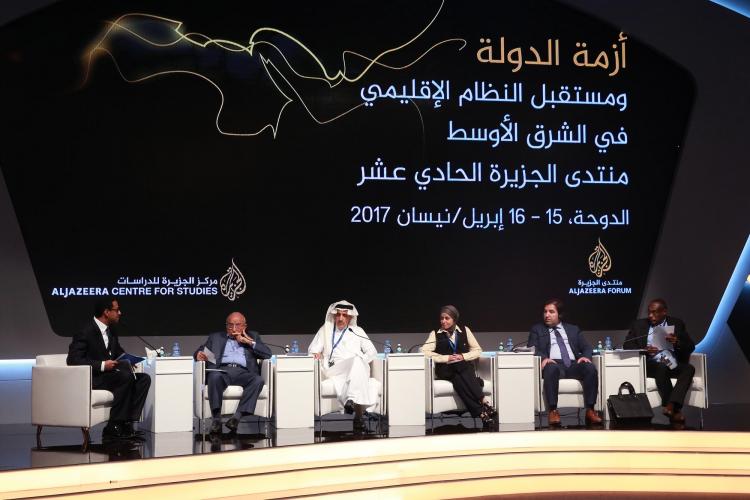
The closing plenary session of the first day of the 11th Al Jazeera Forum, “State Crisis and the Future of the Middle East”, posed an important question to the panelists: Is conflict inevitable, particularly in reference to Iran and Turkey?
Making the opening remarks for this session, Fahmy Howeidy, a journalist and the former deputy chief-editor of Al-Ahram newspaper, said that we have transitioned from aspiring to the dreams of the ummah to the disintegration of the different nations or homelands.
Talking about the ongoing conflicts, Howeidy said that the systems in the Arab world have failed.
“The societies are exhausted, which has given opportunity to different powers to expand and become stronger and take over the wealth of the people. This has led to issues of animosity and conflict,” he said.
He also linked the absence of democracy and succession to the weakening of the Arab world.
Following up with Howeidy’s remarks, former professor of political sociology at King Saud University Khalid Al Dakhil linked the origins of the problems of succession to the time of the Prophet Muhammad. In a poignantly worded remark, Dakhil said, “The question (of succession) is still there, but the answer is not, and that shows the extent of problem of state of governance in Arab world”.
He said the numerous clashes and bloody confrontations playing out across the region are evident of a vacuum of governance and unity, which have led to interventions from foreign powers.
However, he questioned Iran’s exploitation of this vacuum despite being a regional Islamic nation. For this, he blamed the deeply entrenched problem of sectarianism which has existed for centuries.
“Yes, there are problems of development, education, poverty and so on and we do not shoulder responsibility for these problems, and in turn this gives way for sectarian clashes to emerge,” he said.
Al Dakhil went on to discuss the issue of sectarianism in Iran by stating that the fact that the Iranian shura council cannot pass a decree which is not in line with its sectarian school of thought or that a person who is not from the Jafri school of thought cannot be elected president indicates how big a factor sectarianism is in Iran.
“These articles have been manifested on the ground in Lebanon, Yemen, Syria, and have led to confrontation there”.
On the topic of confrontation, Louisa Driss Ait Hamadouche, who is a professor of international relations and political science at the University of Algiers, said that foreign powers have an interest in confrontation in the Maghreb due to its all-important oil reserves.
She pointed out the example of Asian countries, which formed the ASEAN in order to boost their economic interests and have benefited from it.
The Arab states, she lamented, have instead focused on the security and immigration dimensions, which has led to the weakening of this region’s states.
She urged the leaders of the region to focus on regional projects instead of pinning hopes on international projects in order to achieve prosperity.
Galip Dalay, who is the Research Director at Al Sharq Forum, was asked to comment on how Turkey sees the future of this region and its role in the ongoing confrontation.
He stated that Turkey is simply an ally of its own interests, be it with Russia or the US.
“The concept of alliance relies on status quo and when you do not have status quo, there are no allies, which is the case in the Arab region”, Dalay said.
He insisted on the need for a balance and homogeneity of political psyche between the different forces of the Arab world such as Turkey, Iran and Saudi Arabia in order to end the conflict.
Underlining Turkey’s reliance on business and trade, Dalay said, “Turkey can operate better in a stable environment, as it is a trading state so it relies on external factors. The idea of free trade in the Levant with Turkey or population exchange is in Turkey’s interest so the question of whether Iran should be confronted as a sectarian power or a revisionist nation state is of concern to Turkey”.
The last speaker on the panel was Dirdeiry Mohammed Ahmed, a professor of law at the University of Khartoum, and his intervention focused on the Arab vision and its weaknesses.
Ahmed stated that once nation states were formed in the region, on the “rubble of the Ottoman empire”, they could not find any legitimate reasons to stay in power. He cited examples of countries in Latin America where nations found alternatives to the Spanish or Portuguese models.
He said when nations in the Arab world did not have any legitimate reasons to hold on to their powers, they found themselves weakened.
“In Africa, the borders have not changed for 50 years and have become the source of legitimacy but in the Arab world borders are cursed, not respected”.

